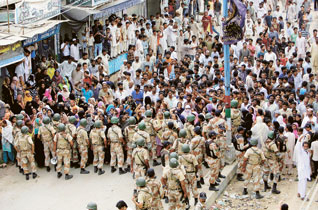
The car lurches to an ungainly stop, as we inch along on a snail’s pace on an extraordinarily congested Faisal Road in Karachi. People appear to be in a mad frenzy to get home, so much so that each bus or truck I spot has scores of people sitting on its roof, because political unrest severely hampers public transport. People clamber upon the buses that are still running, and finding no available seats they gladly ride al fresco. I hear the wailing of a siren in the distance, and my lips move feverishly, hoping, praying, that I reach home in one piece.
I did make it home safely after an extremely disturbing hour on road, but sadly many others did not. Over the last few days, more than a hundred people, civilians, (children amongst them) have been brutally murdered, whilst many have been maimed and crippled for life. We watched the news horror-struck as the death toll kept rising, and political parties and ministers issued statements that, as usual, were of little consequence.
Huddled inside the confines of our homes, those of us who live in or regularly visit Karachi know what terrorism; brutal and untamed, really feels like. We have experienced first-hand what it is like to feel fear (bordering on paranoia) for our lives, hoping our death will not be just another statistic in the blood-fest.
This sprawling metropolis is the financial hub of the country where people from all across Pakistan have migrated to make a living, and generates 70% of the total annual tax revenue collected by the government. The ‘City of Lights’ as Karachi is (somewhat inappropriately) called is one of the world’s largest cities in terms of population, and is almost four times larger than Hong Kong in square area. Unfortunately, it has also served as a battleground for ruling political parties MQM, ANP and PPP.
In the 1980’s ethnic and sectarian violence first marred the landscape, and in the 1990’s the situation aggravated. The average citizen of Karachi in those days was used to ‘halaat kharab’ (tense situation), but hope was always around the corner, and each new regime brought with it a wave of much needed optimism. Cut back to the 2000’s and the situation has not improved. According to human rights organisations, 775 people died in political and sectarian shootings and bomb attacks in Karachi in 2010. The BBC reported on the fifth of July this year (before the recent massacre took place) that in the first half 2011, 1100 people have been shot dead in Karachi in severe political unrest. Statistics suggest that the condition is worsening alarmingly. Add to it incidents such as the killing of a civilian Sarfraz Shah, a man who was shot by the Rangers at point-blank range as he begged for life and one can say without a shadow of doubt that Karachi is a perilous place.
Is there no hope for the people of Karachi? Must we live in constant fear, as we witness, every few days, something simply atrocious? Is there no one who can stand up to this cruelty which has plagued the city?
The recent spate of attacks was centred on areas like Qasba Colony, Orangi Town and Kati Pahari where people belonging to low-income groups reside in unbearably filthy conditions. Clean water is accessible only to a lucky few and the demand for electricity far exceeds supply, meaning power cuts for long hours are a norm. Health and education services are rudimentary if at all available. Must these people located in slums who are already disenfranchised, and already in need of aid, suffer in a far more grievous way because of the terrorists who attack their children, homes, shops and even hospitals, mosques and police stations? Is there no mercy in the hearts of those who call themselves human-beings? Strikes happen on a regular basis, and everything is closed down, hampering the already beleaguered economy of Pakistan. People like rickshaw drivers, fruit vendors and builders who earn a daily wage are hit the hardest.
As of now the outlook appears more bleak than anyone, including this writer, who has always called Karachi home would like to admit. Solving the day to day problems of the common man is a far cry, here even the death toll is viewed cynically, treated as a pattern and accepted as a harsh reality. Karachi has turned into a playground for the bullies, who happen to be political parties and one-upmanship happens in the most bizarre way – cold-blooded butchery of people. After all being the more dominant, successful political party is far more important than the loss of an innocent life, right? One hopes that the political parties currently causing havoc reach some kind of agreement with each other and what is essentially a wonderful city with immense potential for growth can survive in peace. One hopes for hope in the hearts of the embittered, jaded citizens of Karachi.








